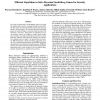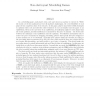909 search results - page 24 / 182 » Games for extracting randomness |
STOC
1997
ACM
13 years 11 months ago
1997
ACM
We examine a class of collective coin- ipping games that arises from randomized distributed algorithms with halting failures. In these games, a sequence of local coin ips is gener...
AAAI
2008
13 years 9 months ago
2008
In a class of games known as Stackelberg games, one agent (the leader) must commit to a strategy that can be observed by the other agent (the adversary/follower) before the advers...
AAAI
2006
13 years 8 months ago
2006
We derive a recursive formula for expected utility values in imperfect- information game trees, and an imperfectinformation game tree search algorithm based on it. The formula and...
CORR
2010
Springer
13 years 7 months ago
2010
Springer
Calibrated strategies can be obtained by performing strategies that have no internal regret in some auxiliary game. Such strategies can be constructed explicitly with the use of B...
SAGT
2009
Springer
14 years 1 months ago
2009
Springer
In a scheduling game, each player owns a job and chooses a machine to execute it. While the social cost is the maximal load over all machines (makespan), the cost (disutility) of ...


